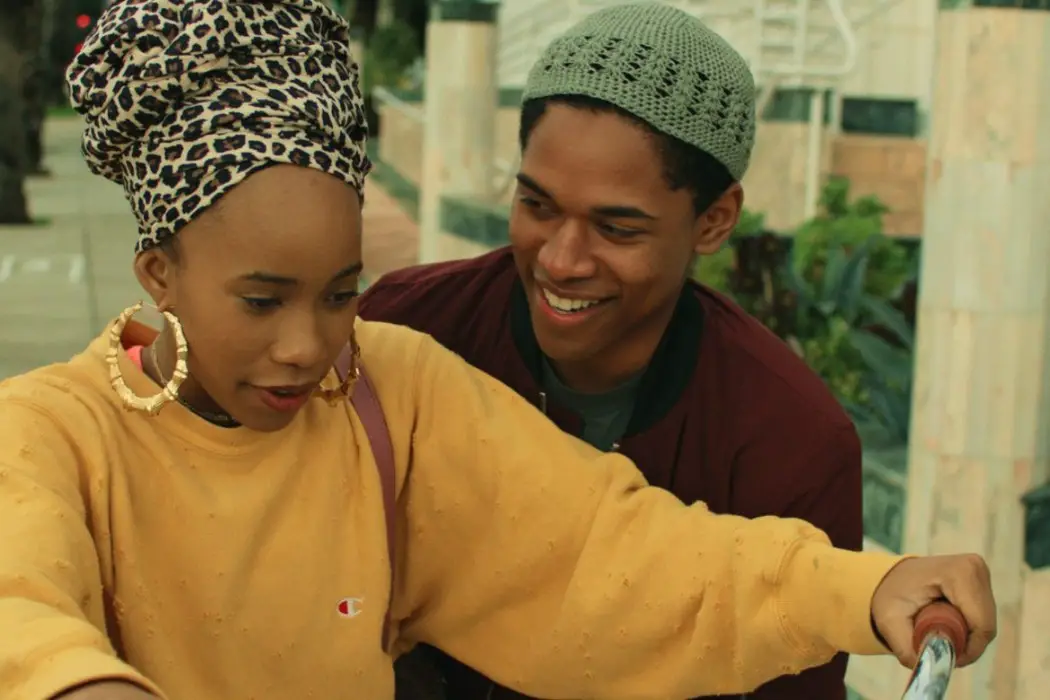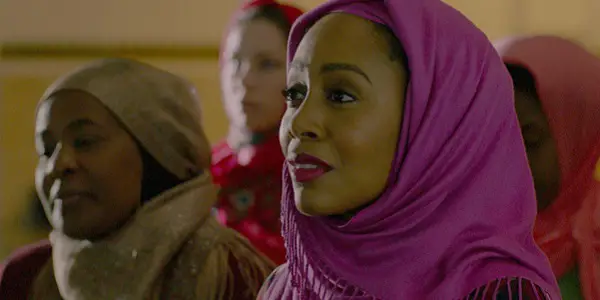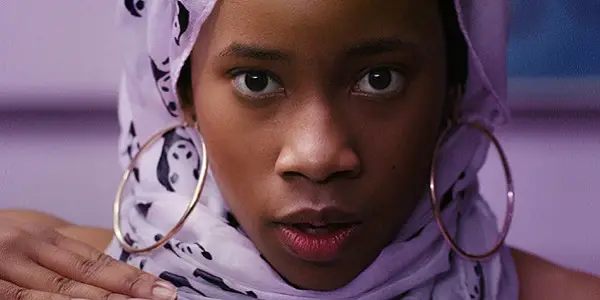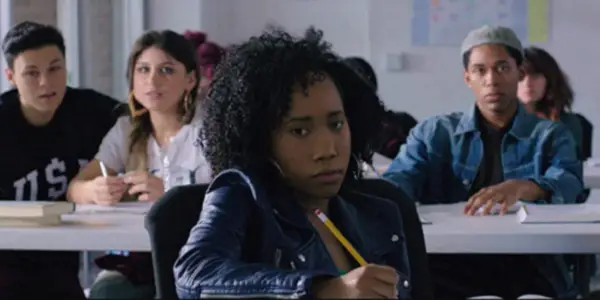JINN: A Colorful & Complex Character Study

Lee Jutton has directed short films starring a killer toaster,…
The feature film debut of writer-director Nijla Mu’min, Jinn tells the story of a young black girl who decides to convert to Islam after her mother does the same. Exploring issues of religion, community and identity through the eyes of women of color, the film shines a light on women who are often left in the dark — women who are flawed, realistic, beautiful and relatable — and reminds us that their stories deserve to be told.
Thanks to some keen direction from Mu’min and brilliant performances from the film’s women leads, Jinn dances with potentially controversial topics like religious tolerance and teenage sexuality and comes out twirling.
Losing My Religion
Summer (Zoe Renee) is a colorful and carefree teenage girl whose personality perfectly reflects her name. An aspiring dancer who hopes to be accepted to CalArts, her main obsessions in life (apart from dance) are pepperoni pizza and posting flirtatious photos on her popular Instagram account. But Summer’s life abruptly changes when her mother, Jade (Simone Missick of Luke Cage), a popular local meteorologist, decides to convert to Islam, despite the risk to her career posed by Islamophobic backlash.

Summer initially brushes off her mother’s conversion, assuming that Jade, who clearly passed the spontaneity gene along to her daughter, is just going through another phase. However, after Summer’s father advises her to try and learn more about why her mother chose Islam, Summer finds herself increasingly drawn to the religion and its complexities. Soon, she too is wearing a headscarf (albeit still posting sexy photos to Instagram while wearing it, complete with the misguided hashtag #HalalHottie), studying the Quran and even trying halal beef pepperoni.
Summer’s interpretation of Islam is much looser and more subjective than Jade’s, naturally leading to conflict between the two. Soon Summer finds herself growing close to a classmate, Tahir (Kelvin Harrison Jr.), who attends the same masjid as her and Jade and whose parents seem much less strict in their religious practice. But, as one can imagine, it can be hard for a hormonal teenager to submerge one’s desire for the sake of piety; Summer’s attraction to Tahir has consequences that ripple out beyond her own bedroom, further than she could have imagined.
The Power of Women
At its core, Jinn is a story of two women searching for their true selves. Mu’min’s vivid, eye-catching direction brings a sharp sense of style to the film that isn’t quite matched by her script, which contains several awkward scenes that lack believability. I was not surprised to learn that Jinn received a Special Jury Award at this year’s SXSW Film Festival, but I was surprised to hear it was for writing, especially since the film has so many other exceptional qualities.
Yet thanks to the intense, intimate performances Mu’min gets out of her cast, Jinn feels authentic in its emotions even when the story stumbles over certain plot points.

Newcomer Zoe Renee has charisma to spare, holding every inch of the screen with confidence and grace that belies her age. It is worth noting that, in Renee and Helena Howard of Madeline’s Madeline, moviegoers have been gifted two wildly remarkable performances by young actresses making their feature debuts in the span of one year. That both starred in indies directed by women is not a coincidence. Renee brings equal measures of truth to Summer’s moments of naivety and her moments of clarity, reminding us that while teenagers might be foolish at times, they’re also capable of introspection beyond expectations.
There are instances when one wants to throw Summer out the window of a moving car (who doesn’t want to do that with most teenagers, though?) and others when you just want to hug her and tell her everything will be alright, even if you too aren’t sure whether or not it will be. Her interpretation of Islam, while perhaps offensive to some hardliners, shows how religion is such a complex and multifaceted thing, viewed and practiced differently by so many. As Summer quickly learns, organized religion can offer one a sense of freedom, but it can also take it away.

Renee is the shining star of the film, but in Missick she has the perfect foil to reflect and accentuate her light. Jade’s own quest for self-discovery via the embrace of Islam mirrors Summer’s even as it differs from hers in scope and reason. Both Summer and Jade struggle with how those on the outside perceive their faith; Summer’s friends tease her for wearing a headscarf, while Jade is warned that she may be forced off the air if she continues to wear hers. Yet both women also refuse to let those on the outside dictate how they choose to feel fulfilled in their inner lives.
They share an inherent strength and stubbornness that lead them to frequently clash with each other and others, but that also gives them the will to keep going in the face of adversity. Few films feature even one woman character this complicated and powerful; Jinn features two and deserves all the more respect for it.
Jinn: Conclusion
Jinn is a colorful portrait of the complexities inherent in life, love, and religion that succeeds as a character study far more than as a plot-driven story. It’s a refreshing addition to the ever-growing pantheon of coming of age films and a wonderful calling-card for Mu’min, a talented filmmaker who deserves more opportunities to tell stories like this.
What do you think? Does Jinn sound like a fresh take on the coming-of-age tale? Share your thoughts in the comments below.
Jinn is released in the U.S. on November 16, 2018. You can find more international release dates here.
Does content like this matter to you?
Become a Member and support film journalism. Unlock access to all of Film Inquiry`s great articles. Join a community of like-minded readers who are passionate about cinema - get access to our private members Network, give back to independent filmmakers, and more.
Lee Jutton has directed short films starring a killer toaster, a killer Christmas tree, and a not-killer leopard. Her writing has appeared in publications such as Film School Rejects, Bitch: A Feminist Response to Pop Culture, Bitch Flicks, TV Fanatic, and Just Press Play. When not watching, making, or writing about films, she can usually be found on Twitter obsessing over soccer, BTS, and her cat.













